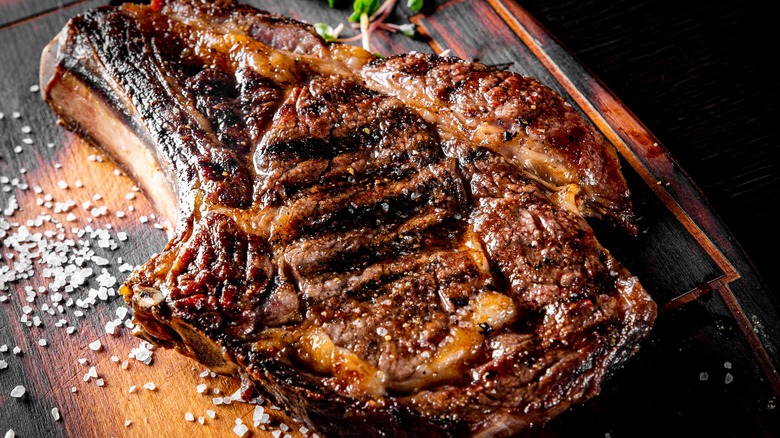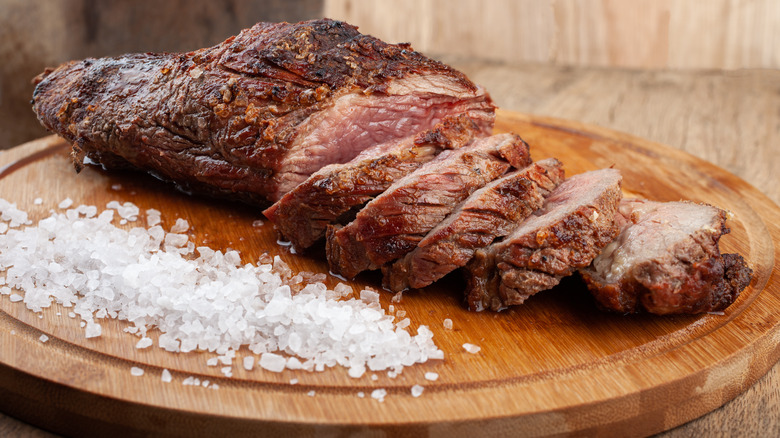Anthony Bourdain's Top Tip For Salting Steak On The Grill
Anthony Bourdain became legendary for his brutally honest, confessional culinary writing and his unquenchable curiosity about global cuisines. But his passion for food was fostered first in New York City kitchens, where he rose through the ranks to become executive chef at a notable Manhattan restaurant. And it's sure hard to become an executive chef in one of the world's food capitals without knowing a thing or two about how to cook a mean steak.
Bourdain's favorite way to prepare steak for grilling wasn't a time-consuming method: salting the steak just before it hits the grill. In a video shared on his culinary travel show "No Reservations" Facebook page, Bourdain shared that he preferred to add a copious amount of salt to his steaks. Salt draws out moisture from whatever it touches, so it's understandable that perhaps Bourdain didn't want to remove too much moisture from the steak by letting a large amount of salt sit on it for too long. Of course, you also want to make sure you get the most flavor out of your steak.
Your salting method can depend on the steak cut and thickness
Steaks often come in thick cuts, which is why Bourdain's rule of more is more rings true when it comes to salting steak. You want enough salt to permeate the steak's surface, while leaving a bit on the outside to develop a clean sear and flavorful crust. This extra amount of salt aids in setting off the Maillard reaction, drying out the surface of the steak so it caramelizes once it hits the hot grill. By adding the salt right before grilling, you still keep most of the thick steak's inner moisture intact. So don't fret about using much seasoning to cook your steak to perfection, as most of the salt won't have time to make its way through the entire thick steak completely.
For many steaks, Bourdain's preferred method should work perfectly. The steak doesn't need much time to absorb the salt especially if the meat is a high-quality cut already jam-packed with luscious flavor. However, other expert sources recommend a slightly different method, using a salt marinade to imbue the steak with even more flavor. One way to measure the salting time is to base it on the steak's thickness -– for every inch of thickness, let the steak sit with the salt for one hour. This allows the salt to draw out the moisture and the steak to reabsorb it, resulting in a juicy, extra-flavorful steak. Ultimately, it all comes down to personal preference.
The quality of the salt matters most
Ultimately, when you salt your steak, it's often based on individual preference, as Bourdain qualifies at the end of the aforementioned video. Bourdain, however, understood that as long as you grill the steak at a very high temperature, salting just beforehand is sufficient for maintaining the steak's juiciness and forming a crispy golden-brown crust. But there's one element that Bourdain surely wouldn't waver on, and you shouldn't either: the quality of the salt you use.
Using the wrong kind of salt is one of many common steak seasoning mistakes. A thick, succulent steak must meet its match in a thick, flaky salt. Ordinary, iodized table salt just won't do. Instead, seek out a quality coarse sea salt or kosher salt. Bourdain advises to not only sprinkle the coarse salt on the steak's surface but to press the salt into your steak evenly, so the large flakes can cling and absorb into the meat before hitting the grill, creating that desired golden crust. Make sure to cover the steak's surface thoroughly, and then you can toss them straight onto the grill for delicious steaks cooked just how the culinary world's bad boy, Anthony Bourdain, liked it.


